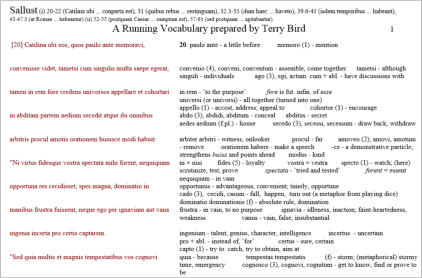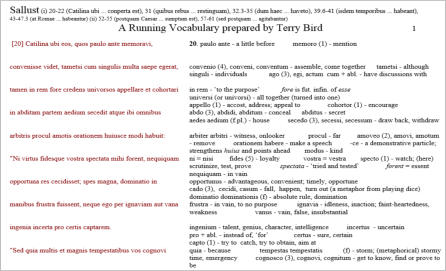
© MMXXIV T A Bird Classics


Classics resources


I want to argue that the use of running
vocabularies is extremely helpful for those
attempting to learn the ancient languages.
For those unfamiliar with such aids, please
look at my sample pages.
I began giving out running vocabularies for
Latin and Greek texts over thirty five years
ago at Colchester Royal Grammar School. I was sometimes aware
that others were trying this out (for instance, Reading Greek) but I
don't think in such a thorough-going or widespread way. I have used
them so much that they have become a method.
I suppose that I felt a thousand sneers at my shoulder. It was only
too easy to represent what I was doing as spoon-feeding. How is a
student going to learn vocabulary if it is always on tap? I very
carefully weighed these objections.
Once a pupil myself, I remember the stunning chore of looking
words up. I tried to learn vocabulary to cut down the work, but it
always remained tremendous labour, and after this essential
preliminary there was always the task of translating as well. I
suppose I looked up vocabulary in the old blue Macmillans and their
like. The entries were workmanlike but sometimes the translations
were antiquated or slightly askew, sometimes a curious rag-bag of
definitions that seemed nothing to do with the text in hand. The
smaller versions of Liddell and Scott seemed to take pleasure in
making it impossible to find difficult verb forms.
How had I ever acquired that special feel for the meaning of a
word that half-way decent Classicists start to have? Simply by vast
effort, wide reading and prose composition, I imagine. From the
mid 1960s I experimented both in Greek and Latin until from about
1975 hardly any 'O' Level or later GCSE set books were studied
without running vocabularies. The vocabularies, being from set-
books, were eventually learnt. Many sixth form texts were also
treated in this way. The key improvement was that students spent
more of their time puzzling out meanings, read more and faster,
used notes more selectively and sensibly. For a good many the
process gave them more interest, or was at least far less boring.
Using a running vocabulary, you feel a friend who has been there
before you is at your elbow.
It was very interesting to try this out on Homer, where vocabulary
is such a chore. The speed of translating was revolutionised, and
speed meant that one was meeting words more often, in itself an
aid to learning vocabulary.
There is a technique in preparing such vocabularies, and they can
be done well or badly. Some texts are of course not approached
until a certain stage, with consequences for the vocabulary. You
have to imagine what your students know or may need. They
mustn't be left in a half-way house where they partly use the
running vocabulary and partly look up.
These vocabularies are a terrific chore to prepare, and, close to,
seem rather trivial. Make a mistake and you feel a fool. Yet I am
convinced that they are very useful indeed.
Do I think vocabulary is unimportant? Not at all. Yet learning to
translate is more important and learning vocabulary can be partly
separated from this. If you use a running vocabulary, you can still
always look up the most interesting words in a dictionary, and
learn vocabulary from the lists.
For Latin texts the vocabularies were originally typed. This was
before word-processing and it was difficult to correct mistakes.
You were lucky to get a hundred copies. Greek ones were hand
written and run off on the old Banda machines, with hands
covered in blue ink. This meant that about sixty pupils could have
copies. Photocopying kept previous efforts alive; also the stencil
machine that burnt copies of the originals into skins for printing.
A number of colleagues joined in.
Sometime about 1980, I persuaded Robert Tatam to split the
Bacchae in two and we produced a complete running vocabulary
for it. Forty two sides of A4, double column! I then advertised this
in the JACT bulletin and it went out to many schools.
More than thirty five years later, many schools have discovered
the value of running vocabularies, and that the promise of using
them can make choosing Latin or Greek as an option a more
pleasing proposition for students.

Running vocabularies - the original defence


© MMXXIII T A Bird Classics


Classics resources
Running vocabularies - the original
defence
I want to argue that the use of running vocabularies is extremely helpful for those attempting to learn the ancient languages. For those unfamiliar with such aids, please look at my sample pages. I began giving out running vocabularies for Latin and Greek texts over thirty five years ago at Colchester Royal Grammar School. I was sometimes aware that others were trying this out (for instance, Reading Greek) but I don't think in such a thorough-going or widespread way. I have used them so much that they have become a method. I suppose that I felt a thousand sneers at my shoulder. It was only too easy to represent what I was doing as spoon-feeding. How is a student going to learn vocabulary if it is always on tap? I very carefully weighed these objections. Once a pupil myself, I remember the stunning chore of looking words up. I tried to learn vocabulary to cut down the work, but it always remained tremendous labour, and after this essential preliminary there was always the task of translating as well. I suppose I looked up vocabulary in the old blue Macmillans and their like. The entries were workmanlike but sometimes the translations were antiquated or slightly askew, sometimes a curious rag-bag of definitions that seemed nothing to do with the text in hand. The smaller versions of Liddell and Scott seemed to take pleasure in making it impossible to find difficult verb forms. How had I ever acquired that special feel for the meaning of a word that half-way decent Classicists start to have? Simply by vast effort, wide reading and prose composition, I imagine. From the mid 1960s I experimented both in Greek and Latin until from about 1975 hardly any 'O' Level or later GCSE set books were studied without running vocabularies. The vocabularies, being from set-books, were eventually learnt. Many sixth form texts were also treated in this way. The key improvement was that students spent more of their time puzzling out meanings, read more and faster, used notes more selectively and sensibly. For a good many the process gave them more interest, or was at least far less boring. Using a running vocabulary, you feel a friend who has been there before you is at your elbow. It was very interesting to try this out on Homer, where vocabulary is such a chore. The speed of translating was revolutionised, and speed meant that one was meeting words more often, in itself an aid to learning vocabulary. There is a technique in preparing such vocabularies, and they can be done well or badly. Some texts are of course not approached until a certain stage, with consequences for the vocabulary. You have to imagine what your students know or may need. They mustn't be left in a half-way house where they partly use the running vocabulary and partly look up. These vocabularies are a terrific chore to prepare, and, close to, seem rather trivial. Make a mistake and you feel a fool. Yet I am convinced that they are very useful indeed. Do I think vocabulary is unimportant? Not at all. Yet learning to translate is more important and learning vocabulary can be partly separated from this. If you use a running vocabulary, you can still always look up the most interesting words in a dictionary, and learn vocabulary from the lists. For Latin texts the vocabularies were originally typed. This was before word-processing and it was difficult to correct mistakes. You were lucky to get a hundred copies. Greek ones were hand written and run off on the old Banda machines, with hands covered in blue ink. This meant that about sixty pupils could have copies. Photocopying kept previous efforts alive; also the stencil machine that burnt copies of the originals into skins for printing. A number of colleagues joined in. Sometime about 1980, I persuaded Robert Tatam to split the Bacchae in two and we produced a complete running vocabulary for it. Forty two sides of A4, double column! I then advertised this in the JACT bulletin and it went out to many schools. Some thirty five years later, many schools have discovered the value of running vocabularies, and that the promise of using them can make choosing Latin or Greek as an option a more pleasing proposition for students.

























